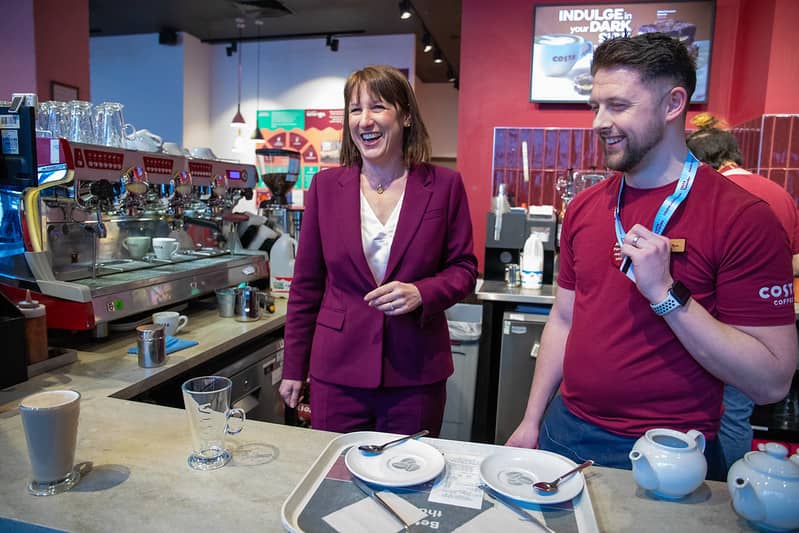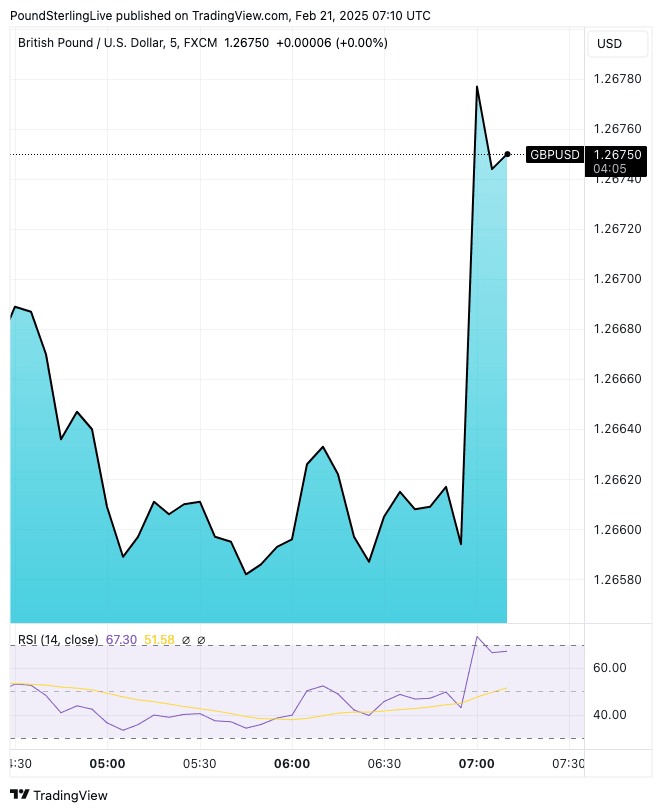
The Chancellor of the Exchequer Rachel Reeves. Picture by Simon Walker / Deputy Prime Minister's Office.
The British Pound rose against the Euro and Dollar after UK retail sales easily beat expectations and the government recorded a rare financial surplus in January.
The Pound-to-Euro exchange rate (GBPEUR) jumped to 1.2080 after the ONS said retail sales rose 1.7% month-on-month in January, breezing past expectations for a print of 0.3% and recovering from December's dismal -0.6%.
The Pound-to-Dollar exchange rate rallied to a new two-month high at 1.2678 after markets pared back bets for a Bank of England rate cut in March.
Retail sales growth now stands at 1.0% year-on-year, better than the 0.6% markets anticipated.
"Retail sales data for January provided some good news, showing some decent growth - well above expectations. The economy is proving to be a conundrum for policy makers at the moment. There is no doubt it could do with some stimulus, but inflation is a concern, and this data suggests the consumer is in a healthy state whilst confidence levels show the opposite," says Neil Birrell, Chief Investment Officer at Premier Miton Investors.
However, the Pound's upside potential will be curbed by the details in the report, with Charlie Huggins, an analyst at Wealth Club, saying they are not as good as they first appear.
He explains the recovery was largely due to a significant recovery in food sales. Non-food stores saw sales decline by 1.3%, with clothing sales especially weak, "hardly a sign that consumers are feeling flush."
"The large increase in food sales is clearly a positive for supermarkets, but it may be a worrying sign for other parts of the economy. More people eating at home is especially bad news for restaurants, pubs and bars. These sectors are in dire need of footfall, with their costs set to rise significantly in April following the Autumn Budget," says Huggins.
He warns that few retailers will cheer these figures.
Tax Boost for Reeves
The UK government recorded a surplus of £15.442BN in January said the ONS, thanks to a £117.6BN tax haul in January 2025, an increase of £7.8BN compared to January 2024.
This was largely driven by an increase in self-assessment taxes of £36.2BN, making for the highest January figure on record.
Unfortunately for Chancellor Rachel Reeves, the surplus was £5.1BN lower than the £20.5BN forecast by the Office for Budget Responsibility (OBR) in October 2024.
Still, the current budget balance (day-to-day public sector activities) was in surplus by £24.6BN, the highest since records began in 1997.
Markets Pare Back Rate Cut Bets
The Pound extends a short-term recovery on the back of these data developments as markets reduce expectations for the number of cuts to come from the Bank of England this year.
The market now sees just two cuts as robust demand - as per these retail sales data - suggest additional easing risks exacerbating rising inflation.
This week, the ONS reported inflation unexpectedly rose 3.0% y/y in January and economists warn it is now on course to breach 4.0%, making it harder for the Bank of England to explain why it is cutting interest rates when inflation is running away from the 2.0% target.
The strong retail sales outturn reflects rising wages and a still healthy labour market. This could, however, all change in the spring when national insurance hikes and minimum wage rises are foisted on businesses.
"We expect the pound sterling to remain robust short term as the UK’s rate advantage over European peers rises," says David Alexander Meier, Economic Research analyst at Julius Baer.
Julius Baer thinks the Bank of England will likely remain cautious, holding rates in March. "The BoE's slow pace of cuts will temporarily widen the pound's interest rate advantage," explains Meier.
The Swiss bank sticks to its short-term optimistic outlook on the pound with a 3-month target of EUR/GBP 0.82, with strength likely to fade as the rate advantage narrows later this year.
This translates into a GBP/EUR equation of 1.22.

